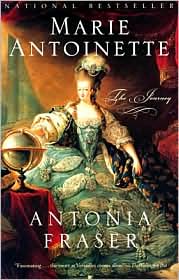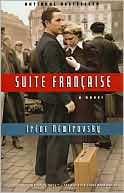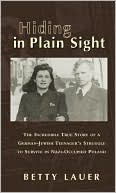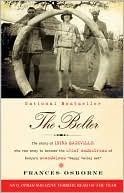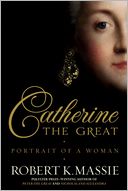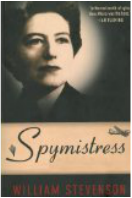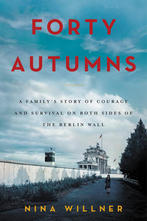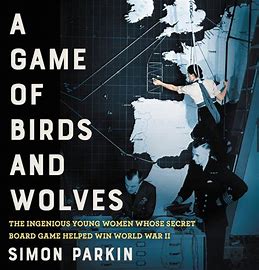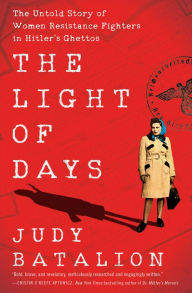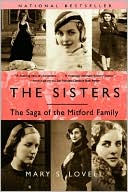
The Sisters: The Saga of the MItford Family Mary Lovell 2003 |
"The Sisters: The Saga of the Mitford Family" tells the (true) story of the Mitford sisters, six beautiful and talented aristocratic young women who came of age in the interwar period.(There was a brother Tom who died during WWII. He does not play a major role in this book nor does it seem in their lives.) These women lived, for the most part, amazing (though not admirable in all cases) lives: Nancy, the oldest, became a best selling novelist; Pamela, the"least interesting" (to the biographer and her family, though not necessarily the reader), lived a country life after a marriage to a brilliant man who married compulsively (six total); Diana, the society beauty, who left her husband for the fascist Oswald Mosley and who befriended Hitler; Unity, whobecame obsessed with Hitler and met him 140 times during a short period before WWII; Jessica, the rebel, who eloped at 18, became a communist, moved to the states, and became a best selling author on such topics as the funeral home industry; and Deborah, the youngest, who made the most brilliant marriage, to the future Duke of Devonshire. This book details the eccentric but loving childhood of these sisters (though the father had murderous rages that seemed to have a lifelong impact on the children) and the diverse set of political causes and men that both brought them together and drove them apart over the years. Any book that affords the reader glimpses of Churchill as an uncle, Hitler as a "friend", Maya Angelou as an honorary "sister", is worth its price. Lovell presents her material in a straightforward manner. The book is thoroughly researched. It is a great read particularly for those fascinated by the British upper classes between the two wars. Reviewed by crazyforgems |
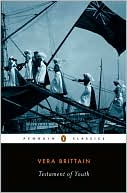
Testament of Youth Vera Britain 2005 (reissued) |
The word "classic" gets thrown around a lot these days. Many so-called "modern classics" are not that important, but "Testament of Youth" deserves this reprint as a Penguin Classic. Brittain tells of her early life in the north of England between 1893 and the start of World War I in 1914 in beautifully clear prose, and her clarity of thought and powers of observation make the bulk of the book, dealing with the war's impact on her, painfully vivid without ever lapsing into self-pity. Like too many others of her generation (and the next and the next) Vera Brittain learned almost unimaginable lessons about life and her own inner strength. To that extent, "Testament of Youth" can serve as both example and inspiration.
Vera Brittain came from an upper-middle-class background shared by millions of young women in late Victorian England. One thing that made her different was her great intellectual curiosity and determination to escape a truly suffocating existence that few of today's Western women can easily imagine. What made her like most citizens of the time and of later times)was her complete ignorance of the meaning of "war." Patriotism, her social conscience, and a desire to take part in the bigger world led her to volunteer as a nursing sister with the British Army. Her grueling hospital experiences were a revelation to her. Her personal losses are even more powerfully revealing of the human condition. Brittain was a "survivor" in every sense of the word. "Testament of Youth" is just as fresh and moving today as it was when it was written 75 years ago and Vera Brittain tells a story that must be told and retold to each generation. For every reader who finds the book "too long" by current standards (its almost 700 pages), there will be two who wish they could follow the author even further. But even if you find yourself skipping ahead, particularly in the early part, you will not be able to forget Vera Brittain or her story. "Testament of Youth" is one of the great autobiographies of the past 100 years. reviewed by Moose Squirrel |
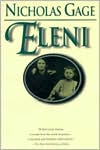
Eleni Nicholas Gage 1983 |
Human diminishment is the theme of this masterwork, which shows how people can sacrifice their rational powers and nobler instincts on the altar of a reductionist ideology, then descend into the (home) economics of envy and the politics of resentment, and end up killing off even the mildest opposition. Concretely, it is about how Communist guerrillas in Epirus took over the village of Lia, reduced the once sturdy villagers to treacherous, starving, vermin-infested semi-savages, used them for slave labor, and finally murdered many of them. The story centers on Eleni Gatzoyiannis, who attempts to escape with her children, more for their sakes than her own. The Communists manage to get other villagers to snitch on her and they end up torturing and murdering her in a ravine along with a few other villagers. Nicholas Gage reports here on what he found out about exactly what happened in that doomed village and what happened to Eleni. Gage is, in fact, Eleni's only son and he managed to escape to America just before the Greek national armies managed to rid the northern mountains of the Communists. A successful journalist in the US, he has written a marvelous account of some unsettling and depressing events. Toward the end of the book he has the chance to take revenge on the person most responsible for his mother's fate, but decides it would be a more fitting tribute to her if he did without his revenge. Some parts of the narrative are (necessarily) reconstructed, but in general the work is faithful to the facts of history. Extremely powerful, it will stay with the reader long after the reading is finished.
Reviewed by Alekos |
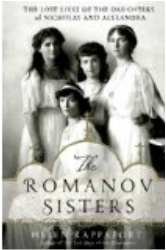
This is an incredible book, beautifully written and researched. It is also heartbreaking. I can’t tell you how many times I read something about one of the four Romanov sisters, the doomed daughters of Czar Nicholas and Alexandra, that caused me to stop reading and just stare at the faces on the cover. The author brings these young women to life, and it is impossible not to grieve for the innocent, young lives lost too soon.
Although the title refers to the four sisters (who referred to themselves as OTMA – Olga, Tatiana, Maria and Anastasia), the book actually begins before the marriage of their parents. Nicholas and Alexandra came to love each other very much; they were absolutely perfect for each other. They were absolutely wrong for the Russian monarchy. Nicholas would have made a wonderful country gentleman. Alexandra was very shy and suffered from health problems that limited her mobility. They were, however, warm and loving persons. How happy they could have been in other circumstances.
From Alexandra, Russia expects two things – for her to give birth to a son, and for her to be a social leader. Instead, she is almost invisible except for the disappointing announcements, one after another after another, of the birth of her daughters. And then, while the rest of the world is fascinated by the four Grand Duchesses, in Russia they are viewed as irrelevant and unimportant.
The Romanov Sisters: The Lost Lives of
the Daughters of Nicholas and Alexandra
Helen Rappaport
2014
The girls live in virtual isolation. The only freedom they have is when they travel, especially on their yacht. They are constantly under threat, and they are constantly surrounded by armed guards. Still, they are brought up to be loving and charitable persons. Their personalities do come across. Anastasia is often a brat. Tatiana and Maria are stalwart. Olga, the oldest, is the most deeply affected by their confinement. She should have long been married and away, but instead she is kept at home. I just wanted to scream how unfair it all was. When they traveled outside of Russia, I wanted someone to stop them from going back. I wanted someone to rescue them, to protect them, to take care of them.
Reviewed by JLee
Although the title refers to the four sisters (who referred to themselves as OTMA – Olga, Tatiana, Maria and Anastasia), the book actually begins before the marriage of their parents. Nicholas and Alexandra came to love each other very much; they were absolutely perfect for each other. They were absolutely wrong for the Russian monarchy. Nicholas would have made a wonderful country gentleman. Alexandra was very shy and suffered from health problems that limited her mobility. They were, however, warm and loving persons. How happy they could have been in other circumstances.
From Alexandra, Russia expects two things – for her to give birth to a son, and for her to be a social leader. Instead, she is almost invisible except for the disappointing announcements, one after another after another, of the birth of her daughters. And then, while the rest of the world is fascinated by the four Grand Duchesses, in Russia they are viewed as irrelevant and unimportant.
The Romanov Sisters: The Lost Lives of
the Daughters of Nicholas and Alexandra
Helen Rappaport
2014
The girls live in virtual isolation. The only freedom they have is when they travel, especially on their yacht. They are constantly under threat, and they are constantly surrounded by armed guards. Still, they are brought up to be loving and charitable persons. Their personalities do come across. Anastasia is often a brat. Tatiana and Maria are stalwart. Olga, the oldest, is the most deeply affected by their confinement. She should have long been married and away, but instead she is kept at home. I just wanted to scream how unfair it all was. When they traveled outside of Russia, I wanted someone to stop them from going back. I wanted someone to rescue them, to protect them, to take care of them.
Reviewed by JLee
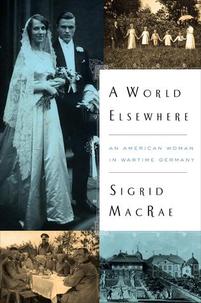
A World Elsewhere: An American Woman in Wartime Germany. Sigrid MacRae 2014 |
Many years ago I latched onto a quote I found by Sydney J. Harris: "When I hear somebody sigh, 'Life is hard,' I am always tempted to ask, 'Compared to what?'" The tribulations that Sigrid MacRae's mother Aimée endured would have brought most people to their knees--yet this incredible account of her fortitude and determination to build a life for her family shows us that perhaps human frailty is simply a personal choice.
I was lucky enough to win an advance copy of this book. I expected to read an impressive and heartrending story about a family surviving WWII Germany, but it was more than that. The beginning of the book sets up painstaking context from post WWI and the Bolshevik Revolution, to the collapse of the Weimar Republic, and finally the rise of Hitler and the reformation that came with him. The history might be a little overwhelming for readers solely interested in a memoir, but I found that the context helped me better understand the key players in this book and why they made the choices they did. I began and finished reading the book in a weekend, which should demonstrate how gripping the narrative is. Without giving much away, I'd thought that when Aimée finally returned to America her luck would improve, but from beginning to end she doesn't seem to catch a single break. Normally, I recommend books that I like to people interested in the particular subject discussed, but this is one of those rare stories that everyone, EVERYONE, should read. MacRae says it best and sums up my own feelings in her Epilogue: "This book taught me that there is not one history, but many; that context is everything, and life is far more complex than we ever imagine." Reviewed by K.V. Luttrell |
|
Spy Mistress
William Stevenson 2022 |
This book was filled with fascinating information about the British SOE, The other British secret agencies, the role of Jews in WW II, the OSS and its relationship with the Brits and the French and Polish Intelligence agencies. Therein lies the problem; there was enough for half a dozen books and the book did not do justice to any single one of these interesting subjects. Nor did it flesh out the suject of the book in enough detail.
Reviewed by AJRSDR |
|
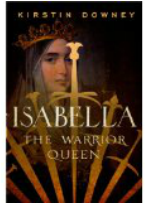
Isabella: The Warrior Queen
Kristen Downey 2014 |
"Isabella: The Warrior Queen", by Kirstin Downey is not only an
excellent bio of Queen Isabella, but is a splendid overview of European
and Ottoman history in the second half of the 15th century. Isabella
of Castile has not been well-received in writings of history. Seen as
the "other half" of Ferdinand of Aragon, she has has been blamed for the
Inquisition in Spain, the mass deportation of the country's Jewish
population, and the problems of exploration and colonization of the "New
World".
Downey takes the effort to view each of these topics in the context of the time and how Isabella reacted to world events. For instance, two years after Isabella's birth in 1451, the Ottoman Turks finally captured the city of Constantinople. They soon began to take Christian lands in what is now eastern Europe. They threatened the entire Mediterranean area and were alleged to have done unspeakable horrors to Christians in the conquered areas. Isabella grew up with this threat and as a fervent Catholic, her most important task as queen was to make sure the Muslims in the small part of Spain they already controlled, did not extend further into her lands. She and Ferdinand - King of Aragon - embarked on the military battles to drive the Muslims completely from the Iberian peninsula. Their success - called the "Reconquista" - brought Christianity to the former southern part of the country. Isabella rode into battles along with her troops. But driving the Muslims from Spain did not bring religious unity to her lands. She and Ferdinand began the Inquisition in an attempt to purify religious worship in Spain. They first went after those Jews who had converted to Christianity, called "conversos". Worried that these "new Christians" were back-sliding into their former faith, religious courts were convened to find these secret Jews. It was a few years later, when Isabella realised that the Jews still practicing their religion were probably influencing those "conversos" she was so concerned with, that she ordered the expulsion of the Jews from Spain. Their forced departure seemed to coincide with the departure of Christopher Columbus and his three small ships westward in October, 1492. She had teased Columbus for years about sponsoring his explorations and finally gave permission and funding in early 1492. Kirstin Downey also does an excellent job at examining Isabella's influence on the future of Europe. The mother of five children - four daughters and one son - she raised her children as well-educated future leaders. Marrying off the daughters in advantageous unions; her grandchildren ruled from Portugal eastward to Bohemia, from Spain northward to England and Burgandy. Isabella's practice of her Catholic faith was a personal one. She felt that all her subjects should practice that faith with the same fervency she did. Was that an excuse for her actions in the Inquisition and the expulsion of the Jews from Spain? No, but it is an explanation of those actions. Kirstin Downey's book is absolutely first rate. For the arm chair historian like me, it gave a well-written look into the world of 600 years ago. Reviewed by Jill Meyer |
|
40 Autumns
Nina Willner 2016 |
You can’t get much more authentic than a memoir written by the daughter of a Holocaust survivor and a mother who escaped communist East Germany just before the Berlin Wall shut off East Berlin. This is Nina Willner’s amazing and brilliantly written “Forty Autumns: A Family’s Story of Courage and Survival on Both Sides of the Iron Curtain”. Willner’s narrative begins with a Preface in which she recalls herself as a kindergartner, being upset because she had no one to “show off” at Grandparents’ Day. That’s when she was told her maternal grandparents lived “behind the curtain” – what she later learned was the Iron Curtain – and could only rarely be contacted, and that with great circumspection. From that point, an intricate development of the heartrending story evolves: how her grandmother, “Oma” saw the end of WWII in their home in Schwaneberg, which was first liberated by American troops, then turned over to Russia following the Warsaw Pact. Fearing the assault which was rumored to be perpetrated by the Russians, Oma tried to send her eldest daughter Hanna, Nina’s mother, with the Americans as they withdrew, but Hanna panicked and slipped away, returning home, only to realize eventually that she could not endure the oppression of the new communist dictatorship. After two failed (and harrowing) attempts, Hanna finally managed to escape to West Germany, where she eventually met and married Eddie, Nina’s army-officer father. Although keeping in touch was extremely difficult due to the censorship and travel restrictions imposed by the East German regime – which grew ever more repressive during the Cold War era -- the “family connection” was never totally broken, and after the fall of the Berlin Wall in 1989, this amazing family was indeed reunited, although by that time Hanna’s parents and three of her brothers had passed away. In addition to the wonderful narrative, Willner thoughtfully provides a family tree, and an exhaustive chronology of major events in her family paralleling world events that occurred at those times. She also gives a somewhat more detailed summary of “Historical Notes After the Fall” in which she discusses what became of various groups following the liberation of East Germany. From a personal perspective, I found this story not only extremely enlightening but also wonderfully hopeful. Given all the political and material vicissitudes this amazing family experienced, their continued family solidarity and – as the subtitle indicates – courage and survival – is awesomely inspirational. Reviewed by Trudie Barreras |
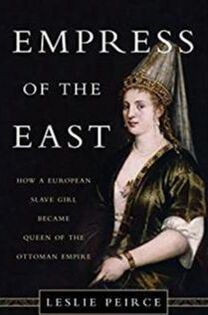
|
This is an incredible story of a famous Ottoman royal written by the brilliant historian Leslie Peirce! It’s a story of how one woman can change everything, can change an empire! Roxelana was a 16th century slave who rose through the ranks to become the legal wife of the greatest Ottoman Sultan that ever lived— Suleiman the Magnificent. His reign was the “Golden Age” of the empire.
I don’t see many mainstream books about the Ottoman Empire and often they are horribly erroneous or disappointing! Ottoman history is complicated and it’s pivotal that historians use the right sources and records. Using the letters and journals of Europeans is not a realistic depiction of the Ottomans, and its important that historians use actual Ottoman records and use the books and materials of Turkish historians who have access to these records. Peirce is a stellar historian and writer who has done her research responsibly and really does the Ottomans justice. I have also read her previous book The Imperial Harem, which was also excellent! She has conducted her research of Ottoman history meticulously, using sources that get us closest to the records of what really happened. It’s shocking how some writers have taken ridiculous liberties with the Ottoman past to conjure up a history that has nothing to do with the real thing! Reviewed by Yelda Moers |
Empress of the East
Leslie Peirce
2017
Leslie Peirce
2017
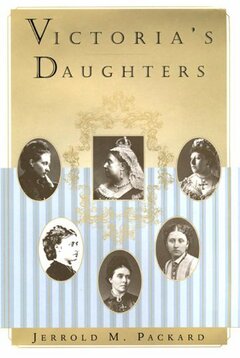
Victoria"s Daughter Jerrold Packard 1999 |
Just finished Victoria's Daughters by Jerrold M Packard. It's the stories of the lives of the five daughters of Queen Victoria and Prince Albert. Of course their 4 brothers are in there also. It was interesting to see how controlling Queen Victoria was in the lives of her children after they had grown up and were ready for marriage. She did give them a chance to fall in love (because she fell completely head over heels in love with Albert at their second meeting) and she would invite suitable Princes (mostly from Germany) for them to meet. They all got married (not all love matches) She even bargained with a couple of her future son-in-laws that they had to remain in England close by her (at court) if they wanted her daughter. She always wanted to have one daughter at home. She ended up with 40 grandchildren before she passed away. I liked it but Royalty has always fascinated me with all of their rules. No sex No bad words or violence. I give it a 5 - I would read it again.
Reviewed S Cosby |
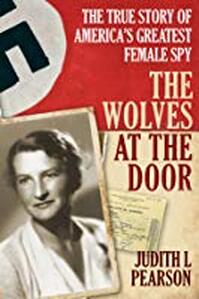
The Wolves at the Door Judith Pearson 2014 |
I have read the book twice and listened to the audiobook once. This is an important perspective on the resistance against the Germans in France during WWII--as well as the role of a remarkable leader, fighter and radio operator. I wish there was more personal information on Virginia Hall, but that is what she would have wanted, anyway. She was modest and downplayed her role.
My initial interest in her was her work as a clandestine radio operator using morse code--and that is my passion, working out of my backpack in the mountains of New Mexico or via set-up on my bicycle. I still meet veteran WWII radio operators on the air, chatting via morse--and I would love to have chatted with Virginia in her later years. Reviwed by John Snell |
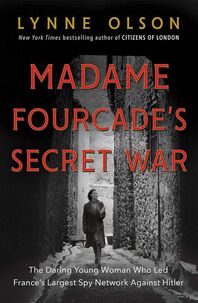
Madame Fourcades Secret War Lynne Olson 2019 |
Individuals from different backgrounds, some military and some not, largely without prior espionage training, came together in a French resistance network that played a large role in assuring Allied victory in the Second World War.
Among their achievements—obtaining and transmitting to the British secret plans for Germany’s V-1 flying bomb and V-2 rocket (which ultimately helped assure the success of the Normandy invasion). Marie-Madeleine Fourcade and the agents of her Alliance network did this while being hunted by the Gestapo. And they did it despite infighting among the Allies. Fourcade overcame the doubts of her male recruits that a woman could run the single most significant resistance network in France. Lynne Olson makes the reader feel as close to the action as possible, without actually being in the same room with Fourcade and her agents. The author weaves together the background, conduct, and emotions of the agents at the center of the story. The anxiety that constantly shadowed them is palpable. With each twist in the tale, she will leave you wondering what will happen next. Reviewed by 539hLz80kx |
|
A Game of Birds and Wolves
Simon Parker 2020 |
A fascinating and highly entertaining peek into lives of the men and women who perfected a board game to help win the Battle of the Atlantic.
I disagree with those who are nitpicking about the subtitle, perhaps because I realistically anticipated what the role of the young women would be. Naturally, the wargame was developed by a male military officer, who ran the show. This was the 1940's, after all. But a deeper reading reveals how skillful they became in a tactical sense, gently guiding real British Navy captains as to the best choice of tactics in a given situation, passing along their considerable skills. Their contribution should not be diminished. These women were in high demand for their unique skills even after the program ended. Ingenious young women? I'd say the description fits quite well. Reviewed by James Boer |
|
The Light of Days
Judy Batalion 2021 |
I read this book in one day, and could not put it down. Author and scholar Judy Batalion reveals the true stories of several heroic Polish Jewish women who actively participated in the resistance against the Nazis, and follows them during the wartime period and afterwards.. These women represent a much larger number whose actions were largely unknown until this book. The author's pioneering research brought these women to life for me, as I marveled at their skills and courage. They faced impossible odds, but chose to fight in various ways, alongside male comrades. Overall, I found this book well-written, detailed, and inspiring.
Reviwed by RTM. |
